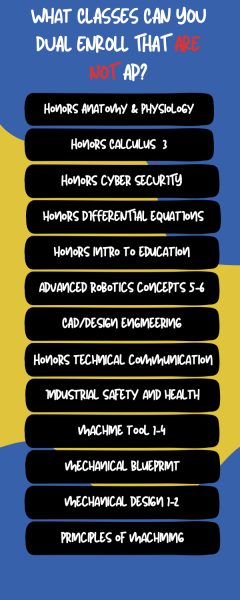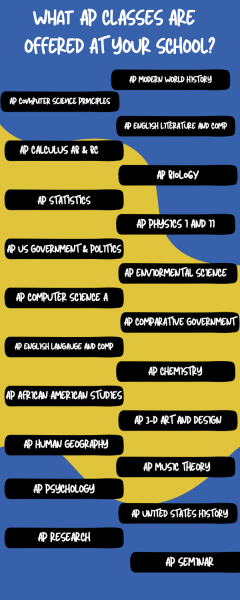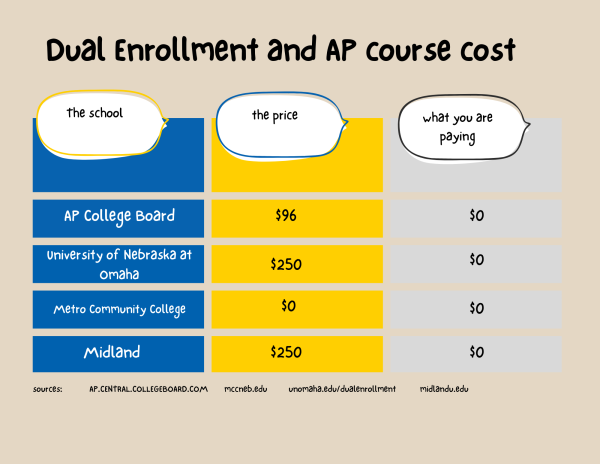North High School’s Advanced Academic program offers many different honors, Advanced Placement (AP), and Dual Enrolled classes. 
North’s honors classes are advanced-level classes that study at a faster pace and provide students with more course knowledge than others. The Omaha Public School District (OPS) is encouraging schools to eliminate honors level courses if an AP equivalent class is offered.
Since North is an AP CapstoneTM school, they currently offer English 3-4 AP Seminar instead of offering an Honors English 3-4 to students. While AP Seminar was offered last year, North introduced the second course of the AP Capstone, which is AP Research.
Successful completion of AP Seminar and AP Research allows students to earn an AP Capstone Certificate. It students also pass 4 additional AP exams can earn the AP Capstone Diploma.
English Teacher Sheila Connor noticed a decrease in her AP Seminar class due to the students not being able to choose between Honors English 3-4 or English 3-4 AP Seminar.
“Having an AP class required at the sophomore level has been a little daunting for my sophomores,” Connor said. “I’m hoping to get those numbers back up once the kids see that it’s a manageable class.”
The curriculum in honors classes across the district can be inconsistent, so it does not allow all students to have equal opportunities in their coursework.
“When you transition to nationally recognized and developed curriculum, such as AP classes, you will have more consistency in what you are offering students,” said Curriculum Specialist Dr. Amanda Gutierrez.
AP and dual enrolled courses provide students with the opportunity to enhance their education and earn college credits while still in high school.
In order for students to be able to take an AP class, the teacher should participate in a College Board training institute. For courses to be dual enrolled, they must have 18 graduate credits (about six classes) specializing in their course of study.
Many teachers often pursue their master’s degree for their own academic success, but some do it to open more advanced academic opportunities for their students.
Science Teacher Amanda Fricke just finished a cardiopulmonary resuscitation (CPR) basic life support course through the American Heart Association and took the instructor course. This allows her to become certified to teach CPR, which will allow her students can also become certified.
Fricke, who already has a Master’s in Curriculum in Instruction, is working toward her second master’s through the University  of Nebraska—Lincoln’s (UNL) Robert Noyce Science Teacher Membership Program to help improve science education across Nebraska.
of Nebraska—Lincoln’s (UNL) Robert Noyce Science Teacher Membership Program to help improve science education across Nebraska.
“[It allows] me to learn from other science teachers and have the time to read some of the research and some of the engagement practices, to bring them back to my classroom, and to see how it works for my classroom and my students,” Fricke said.
Although Fricke has limited free time due to taking classes, the most exciting part for her is being able to sit down and write a list of all the field trips and guest speakers that can be brought into the classroom.
“I truly am passionate in what I do, and I enjoy learning more about all those [science] things,” Fricke said.
Due to COVID-19, OPS received funding that has allowed them to pay for students to take dual enrollment courses and AP exams at no personal financial expense. These funds also allow teachers to engage in continued learning through two programs.
The first program, the Teacher Advanced Academy, is for teachers with master’s degrees who want 18 additional credit hours in their content area. The second is the Accelerated Teacher-Learning Program, where you do not need a master’s degree to participate but can earn up to nine credit hours.
Both programs are partnered with the University of Nebraska at Omaha (UNO), so teachers participating in it must take the classes through UNO. Teachers are also allowed to participate in both programs.
Although Connor started with a master’s in education, an endorsement in English Second Language (ESL), and about 28 credit hours towards a Master’s in English, she took advantage of the OPS programs and is now able to dual enroll English classes.
“I’m learning more things that I’ve previously had to self-teach myself,” Connor said. “It’s going to help them (students) in the long run.”
Connor has not been the only teacher to take advantage of the accelerated learning programs provided by OPS. North has had many other teachers earn additional graduate credits hours to dual enroll their AP classes.
Although North has had many teachers go back to continue their education, not all teachers have been able to find the time and dedication to not only plan curriculum but to do the curriculum.
“I was fortunate to have the time, but not everybody has the time,” said Connor. “Not a lot of teachers are willing to give up the time that it takes to have these extra classes.”
As OPS continues to provide opportunities for teachers to go back to school, they open more opportunities for students as well.
“If students are considering pursuing a college education, I would encourage them to take Advanced Academic courses,” said Gutierrez. “That way they have a level of preparation and readiness for when they do go to college.” 



